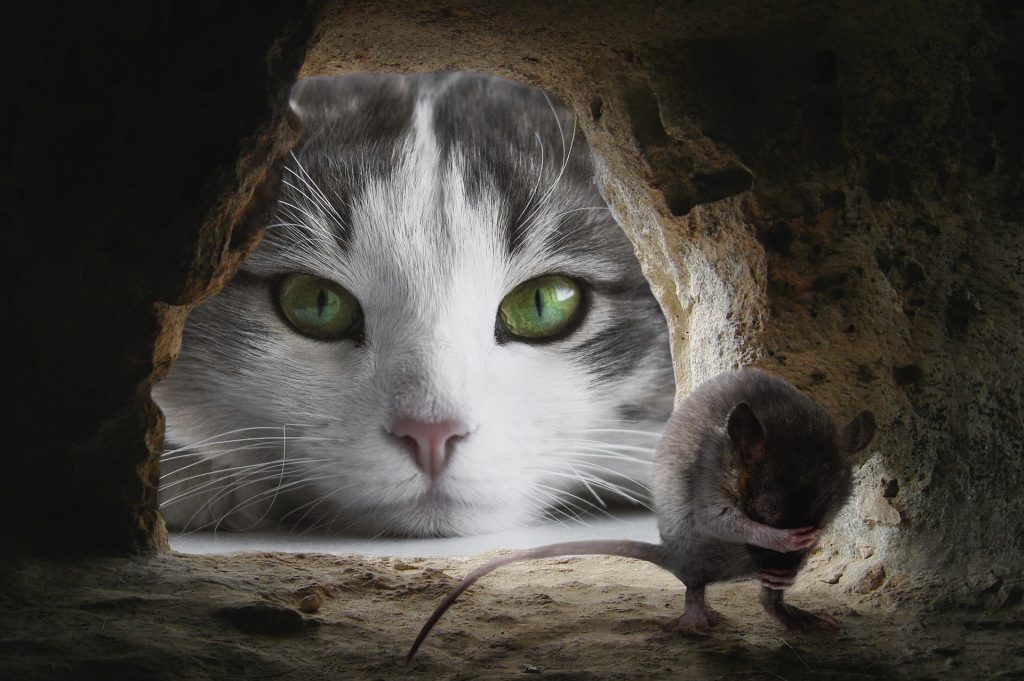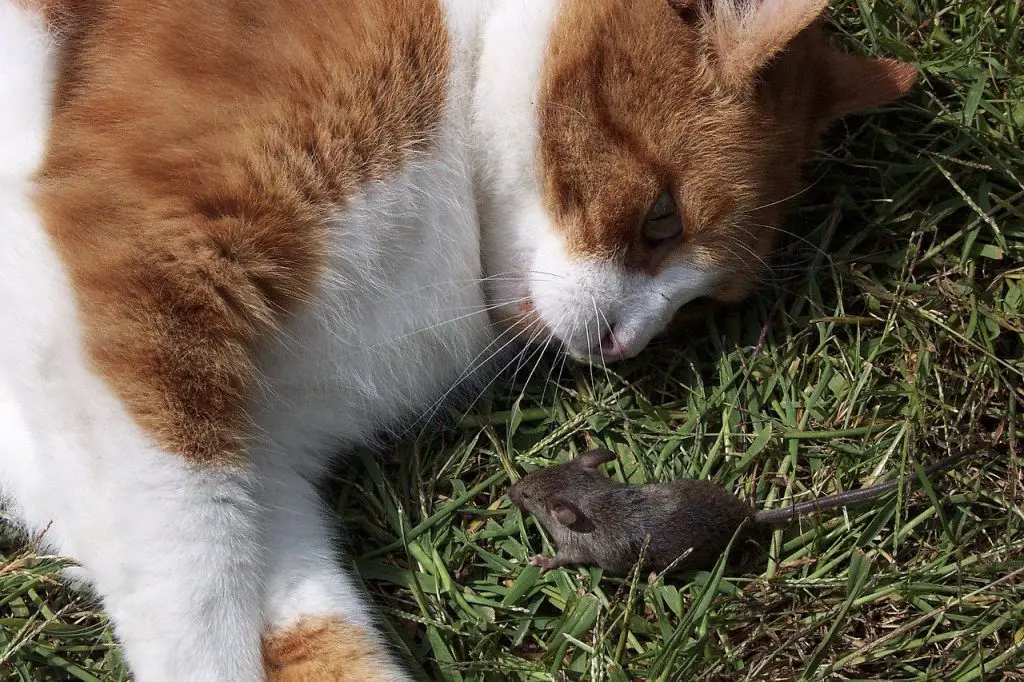Has your cat been in contact with mice? Are you concerned about some possible diseases? You are not alone. It is in cats’ nature to hunt mice. But, can cats get rabies from mice?
In this blog post, we will discuss the symptoms of rabies in cats, how to prevent your cat from getting rabies, and what to do if you think your cat has contracted the disease.
Key Takeaway
- While it is possible for rodents such as mice to contract rabies, it is extremely rare, and thus the likelihood of a cat contracting rabies from a mouse is very low, especially given that a rabid mouse is unlikely to survive long enough to infect a cat.
- Cats can contract diseases from mice, including but not limited to tapeworms and other parasites, hantavirus, leptospirosis, lymphocytic choriomeningitis (LCMV), Tularemia, Salmonella, and potentially indirect poisoning if the mouse has ingested pest poison.
- A cat can potentially get sick from a mouse bite as it can lead to infection or transmit diseases, and if the mouse has consumed pest poison, it could indirectly poison the cat.
Can Cats Get Rabies From Mice?

Cats can undoubtedly get rabies from mice, but it is not the most common way for them to contract the disease. The majority of cases occur when cats are exposed to other infected animals, such as bats, skunks, or foxes.
However, there have been instances where cats have contracted rabies from eating infected mice.
Rabies is most commonly transmitted through the bite of an infected animal, but it can also be spread through contact with an animal’s saliva or nervous tissue. If a cat does happen to catch a mouse that is infected with rabies, the cat could become infected with the virus.
Not all wild mice have rabies. The vast majority of them don’t carry the virus at all. In fact, only a small percentage of wild mice are infected with rabies. Rabies is most commonly found in wild animals like bats, raccoons, and skunks.
There are a few things you can do to protect your cat from contracting rabies. The best way is to make sure they are up-to-date on their vaccinations.
You should also avoid letting them roam outdoors unsupervised. If you live in an area where rabies is common, consider keeping your cat indoors and only taking them out on a leash.
While there is no surefire way to prevent your cat from contracting rabies, following these tips will help reduce the risk. Keep your furry friend safe and healthy by being mindful of their exposure to potentially infected animals. And if you have any concerns, don’t hesitate to contact your veterinarian for guidance.
Can a Cat Get a Disease From a Mouse?

While it is technically possible for a cat to contract a disease from a mouse, it is very unlikely. Cats are much more likely to contract diseases from other cats or from contaminated food or water sources. However, if a cat does hunt and eat mice regularly, it may be at increased risk of contracting certain diseases.
It is possible for cats to get sick from eating wild mice. Mice can carry a number of diseases that are harmful to cats, including toxoplasmosis, salmonella, and listeria.
So, if your cat has eaten a wild mouse, it’s important to watch for signs of illness and take them to the vet if necessary.
There are a variety of diseases that wild mice can carry, including hantavirus, leptospirosis, and salmonellosis. These diseases can be transmitted to cats through contact with mouse urine, droppings, or saliva.
While most cats who become infected with these diseases do not develop serious illnesses, some can cause severe illness or death. Therefore, it is important for your cat to avoid contact with wild mice and their bodily fluids.
There are a few ways that a cat can get infected by a mouse. One way is if the cat directly eats the mouse. Another way is if the cat comes into contact with the mouse’s feces. Finally, if the mouse has fleas, the cat can get infected by coming into contact with them.
Treatment for a cat that has been infected by a mouse will vary depending on the severity of the infection. In some cases, antibiotics may be necessary. If you think your cat has been infected by a mouse, it is important to take them to see a vet as soon as possible says The Spruce Pets.
Can a Cat Get Sick From a Mouse Bite?
Yes, a cat can get sick from a mouse bite. If the mouse is carrying any diseases, it is possible for the cat to contract those diseases. It is important to take your cat to the vet if you think they may have been bitten by a mouse.
The bacteria that cause cat-scratch disease, tularemia, and plague can all be transmitted through the bite of an infected rodent. Cats can also contract rabies from rodents. Although the risk is low in most areas of the world, it is still important to be aware of this potential danger.
Tularemia is a bacterial infection that can affect many different animals, including cats. It is most commonly spread through the bite of an infected flea or tick, but can also be spread through contact with contaminated water or food.
Symptoms of tularemia in cats can include fever, lethargy, loss of appetite, and vomiting. If left untreated, tularemia can be fatal. Fortunately, tularemia is treatable with antibiotics.
Cat-scratch disease (CSD) is a bacterial infection that can be transmitted to humans from cats. The most common symptom of CSD is a red, raised rash that develops around the site of the cat scratch or bite.
Other symptoms may include fever, swollen lymph nodes, and headache. While CSD is usually not serious, it can sometimes lead to more serious health problems, such as encephalitis (inflammation of the brain).
Plague disease is a serious bacterial infection that can affect both humans and animals. Cats can contract plague disease from infected fleas, rodents, or other animals. Symptoms of plague disease in cats include fever, lethargy, loss of appetite, and swollen lymph nodes.
If your cat shows any of these symptoms, please contact your veterinarian immediately. Early diagnosis and treatment are critical for a successful outcome.
What Are The First Signs of Rabies in a Cat?
Rabies is a serious disease that can be fatal to both humans and animals. The first signs of rabies in a cat may include listlessness, lack of appetite, fever, and irritability. Rabies is spread through the saliva of infected animals, so it is important to avoid contact with an animal’s mouth or wounds if you suspect they may have rabies.
Vaccination is the best way to protect against rabies, so make sure your cat is up-to-date on their shots!
Cats typically show signs of rabies after being infected for two to three weeks. However, some cats may show signs sooner or later than this. If you suspect your cat has rabies, it is important to seek medical attention immediately. Early diagnosis and treatment are critical for the best possible outcome.
There are three main stages of rabies in cats:
The first stage is the prodromal stage. This is when the animal starts to show signs of the disease but is not yet infectious. The second stage is the furious stage. This is when the animal becomes aggressive and may attack anything that moves.
The third stage is the paralytic stage. This is when the animal begins to experience paralysis and may die from respiratory failure.
There is no cure for rabies, but it is preventable through vaccination. If your cat has not been vaccinated against rabies, they will need to be quarantined for six months if they have been exposed to the disease.
If you have been bitten or scratched by a cat that you think may have rabies, wash the wound immediately with soap and water and seek medical attention.
FAQs
Q: How do cats get rabies?
A: Cats can get rabies if they are bitten or scratched by an infected animal, such as a rabid dog, raccoon, bat, or fox. It is important to vaccinate your cat against rabies to prevent infection.
Q: How long does it take for a cat to show signs of rabies?
A: The incubation period for rabies in cats can vary, but it is usually between two to eight weeks. However, it can be as short as a few days or as long as several years.
Q: Can indoor cats get rabies?
A: Indoor cats are at a lower risk of contracting rabies compared to outdoor cats. However, it is still possible for indoor cats to get rabies if they come into contact with an infected animal, such as a bat that has entered the home.
Q: How can I protect my cat from rabies?
A: The best way to protect your cat from rabies is to ensure they are up to date on their rabies vaccination. Keep your cat indoors to minimize their exposure to potentially infected animals, and avoid contact with stray or unknown animals.
Q: Can cats transmit rabies to humans?
A: Yes, cats can transmit rabies to humans through bites or scratches if they are infected with the rabies virus. It is important to take precautions and seek medical attention if you are bitten or scratched by a cat, especially if the cat’s rabies vaccination status is unknown.
Q: Are there any natural remedies to prevent rabies in cats?
A: No, there are no natural remedies or homeopathic treatments that can prevent or cure rabies in cats. Vaccination is the most effective and reliable way to protect your cat from rabies.
Q: Can mice carry other diseases that can be transmitted to cats?
A: Yes, mice can carry various diseases that can be transmitted to cats, such as hantavirus, leptospirosis, and toxoplasmosis. It is important to keep your cat’s environment clean and free of mice to minimize the risk of disease transmission.
Q: What should I do if my cat catches a mouse?
A: If your cat catches a mouse, it is best to safely remove the mouse from their mouth and dispose of it properly. Avoid letting your cat eat or play with the mouse to prevent the transmission of any potential diseases.
Conclusion and final thoughts
In conclusion, while cats are at risk of contracting rabies from a bite or scratch from an infected animal like a mouse, it is not common for them to get infected through hunting mice.
However, it is important to keep your cat’s vaccinations up-to-date and to monitor any potential exposure to wild animals.




